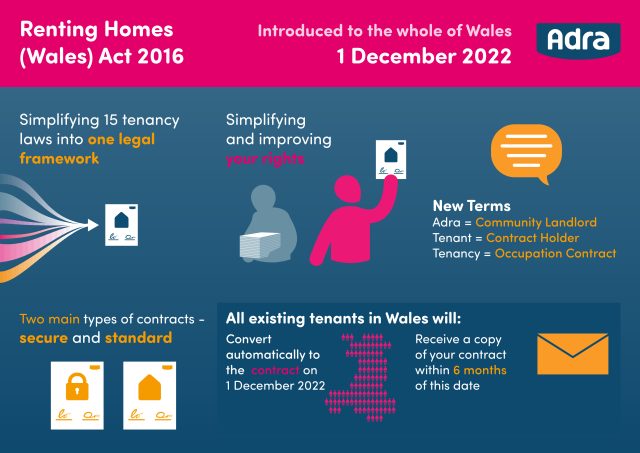Changes to housing law (Renting Homes)
Easy Read Renting Homes: Changes to housing laws
A guide for tenants This document was written by the Welsh Government. It is an easy read version of ‘What Renting Homes means for Tenants and Licensees
Overview
Renting Homes is the biggest change to housing law in Wales for decades. It increases protections for tenants and licensees, and clarifies their rights and responsibilities. Because Renting Homes applies to both tenants and licensees, they are called ‘contract-holders’ under the new law. Your landlord will issue you with an ‘occupation contract’, which will replace your tenancy or licence agreement.
There are two types of occupation contract:
It must also include information that explains the meaning and importance of the contract.
Contracts can be issued in hardcopy or, if the contract-holder agrees, electronically.
-
secure contract:
This replaces secure tenancies issued by local authorities and assured tenancies issued by Registered Social Landlords (RSLs);
-
standard contract:
This is the default contract for the private rented sector (PRS), but can be used by local authorities and RSLs in certain circumstances (e.g. a ‘supported standard contract’ for supported accommodation).
Landlords will send ‘written statements’ confirming the terms and conditions of your contract.
This written statement must contain all required contractual terms.
These are:
-
Key matters:
For example, the names of the parties and address of the property. These must be inserted in every contract.
-
Fundamental Terms:
Cover the most important aspects of the contract, including the possession procedures and the landlord’s obligations regarding repair.
-
Supplementary Terms:
Deal with the more practical, day to day matters applying to the occupation contract, for example, the requirement to notify the landlord if the property is going to be unoccupied for four weeks or more.
-
Additional Terms:
Addresses any other specifically agreed matters, for example a term which relates to the keeping of pets.
-
What is the Renting Homes Act Wales?
- In 2016, the Senedd passed the Renting Homes (Wales) Act 2016 with the aim of making it simpler and easier for landlords and tenants to rent a home in Wales.
- It introduces many changes to tenancy laws and will apply to both social and private rented sectors.
-
When will it happen?
- This happened on 01 December 2022
-
What’s the purpose of the Renting Home Act?
- Simplifies agreements and improves the condition of rental homes in Wales
- Offers greater security and certainty to tenants and landlords
-
Who does it affect?
- All Landlords – private and social
- All Tenants – private and social
-
Why is it happening?
- To make it simpler and easier for landlords and tenants to rent a home in Wales.
-
What is changing?
- New terminology will be used e.g. Tenancy agreement will be know as an Occupation Contract and Tenant as Contract Holder
- Tenancy Agreements will be replaced by Occupation Contracts
- Increase security – 6 months’ notice will need to be given as long as the contract is not breached.
- All properties must be safe – such as working smoke alarms and electrical safety testing.
- A fair and consistent approach to anti-social behaviour.
- Increase Succession rights to pass on your home.
- Contract Holder can be added or removed without the need to end the contract.
- Landlords will be able to repossess Abandoned properties without a court order
-
What does it mean for me as a tenant?
- It will simplify and improve your rights as a tenant.
- It will improve how landlords manage rented homes in Wales
-
How will it affect me?
- Existing tenants will receive a contract within 6 months of the 1 December 2022 replacing your Tenancy Agreement.
- New tenants after the 1 December 2022 will sign the new contract in the usual way and will receive a copy within 14 days.
- Contracts offer you a greater security and certainty.
-
Is it going to cost me money or have an effect on my rent?
- No, this has no effect on your rent or cost you any money.
-
What do I need to do? / Is there anything I need to do?
- The only thing you will need to do is read your contract and familiarise yourself with your rights and responsibilities.
- 1 December 2022 our tenants should use these forms to make changes to their contract – please follow this link to the Welsh Government webpage.

Protection against retaliatory eviction
If a landlord responds to a request for repair by issuing a possession notice, a landlord will no longer be automatically entitled to possession if the Court is satisfied the landlord issued the notice to avoid carrying out the repair.
Joint contracts
Contract-holders can be added or removed from occupation contracts without the need to end one contract and start another. This will make managing joint contract easier and help victims of domestic abuse by enabling the perpetrator to be targeted for eviction.
Enhanced succession rights
Enables both a ‘priority’ and ‘reserve’ successor to succeed to the occupation contract. This allows 2 successions to the contract to take place, for example a spouse followed by another family member. In addition, a new succession right for carers is crea
Supported accommodation
If you live in supported accommodation for more than 6 months, you become entitled to a ‘supported standard contract’. The supported standard contract will operate in a similar way to the standard contract. However, your landlord may include terms in the contract relating to:
- the ability to relocate the contract-holder within the building
- the ability for the landlord to temporarily exclude the contract-holder from the dwelling for up to 48 hours, a maximum of 3 times in 6 months
